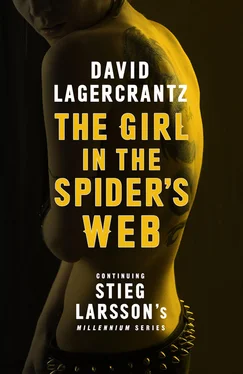“What?”
“Nothing.”
“O.K., you don’t have to tell me.”
“We live in a sick world, Mikael.”
“We do?”
“A world in which paranoia is a requirement.”
“You could be right about that. Good night, Chief Inspector.”
“Good night, Mikael. Don’t do anything silly now.”
“I’ll try not to.”
Blomkvist crossed over Ringvägen and went down into the Tunnelbana. He took the red line towards Norsborg and got off at Liljeholmen, where for about a year Holger Palmgren had been living in a small, modern apartment. Palmgren had sounded alarmed when he heard Blomkvist’s voice on the telephone. But as soon as he had been assured that Salander was in one piece — Blomkvist hoped he wasn’t wrong about this — he made him feel welcome.
Palmgren was a lawyer, long retired, who had been Salander’s guardian for many years, ever since the girl was thirteen and had been locked up in St Stefan’s psychiatric clinic in Uppsala. He was elderly and not in the best of health, having suffered two strokes. For some time now he had been using a Zimmer frame, and had trouble getting around even so. The left side of his face drooped and his left hand no longer functioned. But his mind was clear and his long-term memory was outstanding — especially on Salander.
No-one knew Lisbeth Salander as he did. Palmgren had succeeded where all the psychiatrists and psychologists had failed, or perhaps had not wanted to succeed. After a childhood from hell, when the girl had lost faith in all adults and in all authority, Palmgren had won her confidence and persuaded her to open up. Blomkvist saw it as a minor miracle. Salander was every therapist’s nightmare, but she had told Palmgren about the most painful parts of her childhood. That was why Blomkvist now keyed in the front-door code at Liljeholmstorget 96, took the lift to the fifth floor and rang the doorbell.
“My dear old friend,” Holger said in the doorway, “it’s so wonderful to see you. But you’re looking pale.”
“I haven’t been sleeping well.”
“Not surprising, when people are shooting at you. I read about it in the paper. A dreadful story.”
“Appalling.”
“Have there been any developments?”
“I’ll tell you all about it,” Blomkvist said, sitting on a yellow sofa with its back to the balcony, waiting for Palmgren to settle with difficulty into a wheelchair next to him.
Blomkvist ran through the story in broad outline. When he came to the point of his sudden inspiration, or suspicion, on the cobblestones in Bellmansgatan, he was interrupted:
“What are you saying?”
“I think it was Camilla.”
Palmgren looked stunned. “ That Camilla?”
“The very same.”
“Jesus,” Palmgren said. “What happened?”
“She vanished. But afterwards I felt as if my brain were on fire.”
“I can well understand. I was sure Camilla had disappeared off the face of the earth.”
“And I had almost forgotten that there were two of them.”
“There were two of them alright, very much so: twin sisters who loathed each other.”
“I remember that,” Blomkvist said. “But I need to be reminded of as much as you can tell me, to fill the gaps in the story as I know it. I’ve been asking myself why on earth Salander got involved in this story. Why would she, the superhacker, take an interest in a simple data breach?”
“Well, you know the background, don’t you? The mother, Agneta Salander, was a cashier at Konsum Zinken and lived with her twin daughters on Lundagatan. They might have had quite a nice life together. There wasn’t much money and Agneta was very young and had had no opportunity to get an education. But she was loving and caring. She wanted to give her girls a good upbringing. It was just...”
“That the father came to visit.”
“Yes, the father, Alexander Zalachenko. He came from time to time and his visits nearly always ended in the same way. He assaulted and raped Agneta while the girls sat in the next room and heard everything. One day Lisbeth found her mother unconscious on the floor.”
“And that was the first time she took revenge?”
“The second time. The first was when she stabbed Zalachenko several times in the shoulder.”
“But now she firebombed his car.”
“Yes. Zalachenko burned like a torch. Lisbeth was committed to St Stefan’s psychiatric clinic.”
“And her mother was admitted to Äppelviken nursing home.”
“For Lisbeth that was the most painful part of the story. Her mother was then twenty-nine, and she was never herself again. She survived at the nursing home for fourteen years, with severe brain injuries and suffering a great deal of pain. Often she could not communicate at all. Lisbeth went to see her as frequently as she could, and I know she dreamed that her mother would one day recover so they could talk again and look after each other. But it never happened. That if anything is the darkest corner of Lisbeth’s life. She saw her mother wither away and eventually die.”
“It’s terrible. But I’ve never understood Camilla’s part in the story.”
“That’s more complicated, and in some ways I think one has to forgive the girl. After all, she too was only a child, and before she was even aware of it she became a pawn in the game.”
“In what way?”
“They chose opposite camps in the battle, you could say. It’s true that the girls are fraternal twins and not alike in appearance, but they also have completely different temperaments. Lisbeth was born first, Camilla twenty minutes later. She was apparently a joy to behold, even when she was tiny. While Lisbeth was an angry creature, Camilla had everyone exclaiming, ‘Oh, what a sweet girl!’ and it can’t have been a coincidence that Zalachenko showed more forbearance towards her from the start. I say forbearance because obviously it was never a question of anything kinder in those first years. Since Agneta was no more than a whore to him, it followed that her children were bastards with no claim on his affections, little wretches who just got in the way. And yet...”
“Yes?”
“And yet even Zalachenko noticed that one of the children was beautiful. Sometimes Lisbeth would say there was a genetic defect in her family and, even though it’s doubtful that her claim would stand up to medical scrutiny, it cannot be denied that Zala fathered some exceptional children. You came across their half-brother, Ronald Niedermann, didn’t you? He was blonde, enormous and had congenital analgesia, the inability to feel pain, so was therefore an ideal hit man and murderer, while Camilla... well, in her case the genetic abnormality was quite simply that she was astoundingly, ridiculously lovely to look at, and that just got worse as she grew older. I say worse because I’m pretty sure that it was a misfortune. The effect may have been exaggerated by the fact that her twin sister always looked sour. Grown-ups were liable to frown when they saw her. But then they would notice Camilla, and light up and go soft in the head. Can you imagine what an affect that must have had on her?”
“It must have been tough to get passed over.”
“I wasn’t thinking of Lisbeth, and I don’t remember seeing any evidence that she resented the situation. If it had just been a question of beauty, she probably would have felt her sister was welcome to it. No, I’m talking about Camilla. Can you imagine what it must do to a child who doesn’t have much in the way of empathy to be told all the time how divine she is?”
Читать дальше












